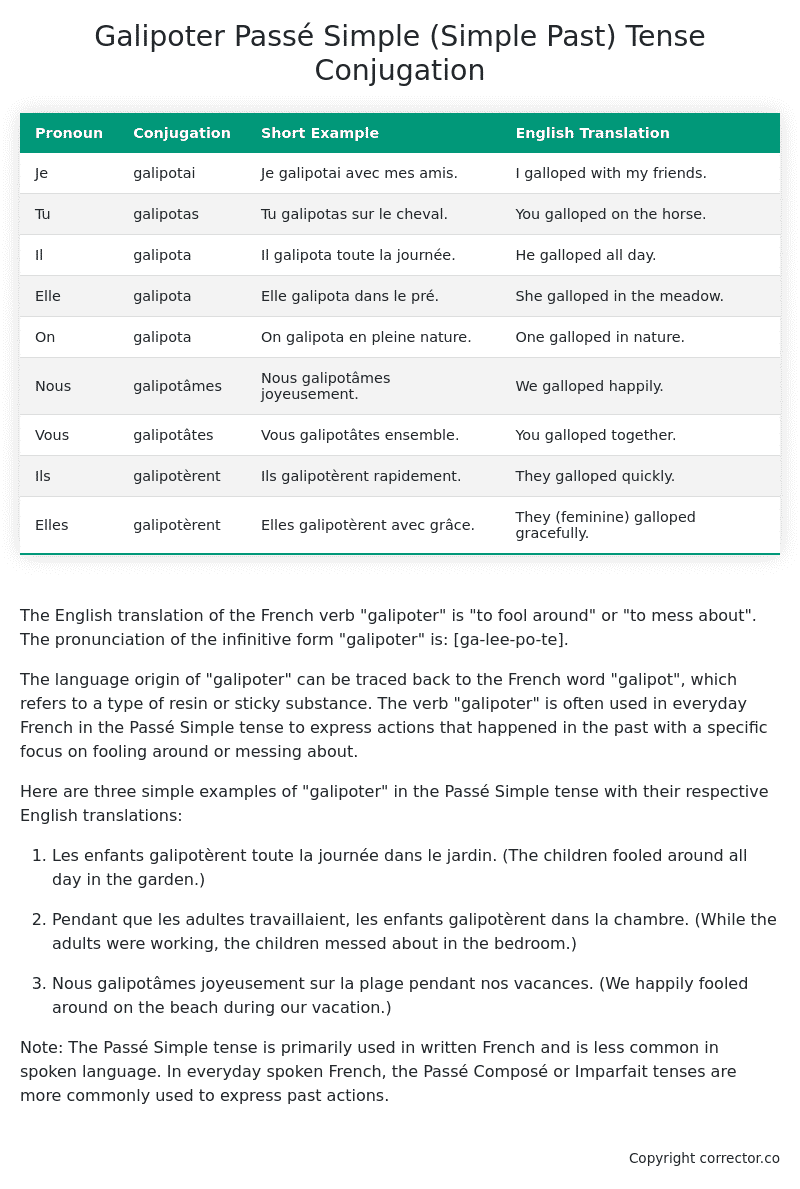Passé Simple (Simple Past) Tense Conjugation of the French Verb galipoter
Introduction to the verb galipoter
The English translation of the French verb “galipoter” is “to fool around” or “to mess about”. The pronunciation of the infinitive form “galipoter” is: [ga-lee-po-te].
The language origin of “galipoter” can be traced back to the French word “galipot”, which refers to a type of resin or sticky substance. The verb “galipoter” is often used in everyday French in the Passé Simple tense to express actions that happened in the past with a specific focus on fooling around or messing about.
Here are three simple examples of “galipoter” in the Passé Simple tense with their respective English translations:
-
Les enfants galipotèrent toute la journée dans le jardin.
(The children fooled around all day in the garden.) -
Pendant que les adultes travaillaient, les enfants galipotèrent dans la chambre.
(While the adults were working, the children messed about in the bedroom.) -
Nous galipotâmes joyeusement sur la plage pendant nos vacances.
(We happily fooled around on the beach during our vacation.)
Note: The Passé Simple tense is primarily used in written French and is less common in spoken language. In everyday spoken French, the Passé Composé or Imparfait tenses are more commonly used to express past actions.
Table of the Passé Simple (Simple Past) Tense Conjugation of galipoter
| Pronoun | Conjugation | Short Example | English Translation |
|---|---|---|---|
| Je | galipotai | Je galipotai avec mes amis. | I galloped with my friends. |
| Tu | galipotas | Tu galipotas sur le cheval. | You galloped on the horse. |
| Il | galipota | Il galipota toute la journée. | He galloped all day. |
| Elle | galipota | Elle galipota dans le pré. | She galloped in the meadow. |
| On | galipota | On galipota en pleine nature. | One galloped in nature. |
| Nous | galipotâmes | Nous galipotâmes joyeusement. | We galloped happily. |
| Vous | galipotâtes | Vous galipotâtes ensemble. | You galloped together. |
| Ils | galipotèrent | Ils galipotèrent rapidement. | They galloped quickly. |
| Elles | galipotèrent | Elles galipotèrent avec grâce. | They (feminine) galloped gracefully. |
Other Conjugations for Galipoter.
Le Present (Present Tense) Conjugation of the French Verb galipoter
Imparfait (Imperfect) Tense Conjugation of the French Verb galipoter
Passé Simple (Simple Past) Tense Conjugation of the French Verb galipoter (You’re reading it right now!)
Passé Composé (Present Perfect) Tense Conjugation of the French Verb galipoter
Futur Simple (Simple Future) Tense Conjugation of the French Verb galipoter
Futur Proche (Near Future) Tense Conjugation of the French Verb galipoter
Plus-que-parfait (Pluperfect) Tense Conjugation of the French Verb galipoter
Passé Antérieur (Past Anterior) Tense Conjugation of the French Verb galipoter
Futur Antérieur (Future Anterior) Tense Conjugation of the French Verb galipoter
Subjonctif Présent (Subjunctive Present) Tense Conjugation of the French Verb galipoter
Subjonctif Passé (Subjunctive Past) Tense Conjugation of the French Verb galipoter
Subjonctif Imparfait (Subjunctive Imperfect) Tense Conjugation of the French Verb galipoter
Subjonctif Plus-que-parfait (Subjunctive Pluperfect) Tense Conjugation of the French Verb galipoter
Conditionnel Présent (Conditional Present) Tense Conjugation of the French Verb galipoter
Conditionnel Passé (Conditional Past) Tense Conjugation of the French Verb galipoter
Conditionnel Passé II (Conditional Past II) Tense Conjugation of the French Verb galipoter
L’impératif Présent (Imperative Present) Tense Conjugation of the French Verb galipoter
L’impératif Passé (Imperative Past) Tense Conjugation of the French Verb galipoter
L’infinitif Présent (Infinitive Present) Tense Conjugation of the French Verb galipoter
L’infinitif Passé (Infinitive Past) Tense Conjugation of the French Verb galipoter
Le Participe Présent (Present Participle) Tense Conjugation of the French Verb galipoter
Le Participe Passé (Past Participle) Tense Conjugation of the French Verb galipoter
Struggling with French verbs or the language in general? Why not use our free French Grammar Checker – no registration required!
Get a FREE Download Study Sheet of this Conjugation 🔥
Simply right click the image below, click “save image” and get your free reference for the galipoter Passé Simple tense conjugation!

Galipoter – About the French Passé Simple (Simple Past) Tense
Formation
Usage
Narration
Historical Context
Interactions with other tenses
Passé Composé
Imparfait
Conditional and Subjunctive
Summary
I hope you enjoyed this article on the verb galipoter. Still in a learning mood? Check out another TOTALLY random French verb conjugation!


